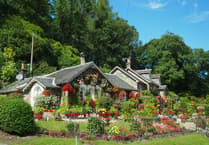Next weekend some of the most skilled craftsmen from across the country will be heading for West Wales to compete in the seasonal task of ploughing the land.
Good ploughing is a traditional art that has evolved since about 1900 - by way of burying old grass and rubbish from the surface of the field -but it’s also, possibly, a dying art.
One example of this cross-over is the growth in interest in no-till, conservation tillage and the use of cover crops, techniques which don’t just reduce soil erosion or prevent nitrogen run-off, but, supposedly, actually helps slow global climate change.
Indeed, some argue that better soil management could not just slow, but actually reverse global climate change. As detailed in a some sections of the farming press, a piece about a piece about the dramatic spread of cover cropping, the basic idea behind these methods is to always have something growing in the soil, creating an ecosystem for soil microbes and adding organic matter and nutrients back to the soil when the cover crops are eventually killed.
Indeed, interest in the benefits in rethinking the use of the plough has grown so fast in recent years that several organisations hosted a national forum on the use of cover crops last year and part of that presentations included a series of videos by innovative farmers around the country.
Those sold on organic farming have assumed that the larger farmers care less about soil health, made for eye-opening viewing but for those who may be adamant that an organic way of farming is the only way to go, this way of thinking is probably not quite so encouraging.
What’s intriguing is that this represents a shift in the conversation - this is no longer about competing ideologies, it’s about exploring what works and sees the beginning of a transition toward eliminating chemical inputs altogether, all farmers and all farms might benefit from an increased focus on soil health, and keeping nutrients, water and carbon in the soil.
As more and more acres across the world move away from intensive ploughing, we all might see some benefits.
Meanwhile, as mainstream ploughing has moved on to much simpler, reversible methods, traditions remain and at the Llangolman Vintage match next Saturday (Wood Park Farm, Maenclochog SA63 4RD) and the Carmarthenshire event on Easter Monday (at Llanddowror, St. Clears SA33 4HU) tractors and ploughs -many 80 years old and more -will be seen in use turning a pristine furrow in the time honoured style.
Both events will begin around 10 am and competitors will complete their tasks by 3 pm - the Carmarthenshire event will also feature a practical demonstration of threshing and also of corn weaving.
caption
Keen local competitor Rob Convery, of St. Clears.




